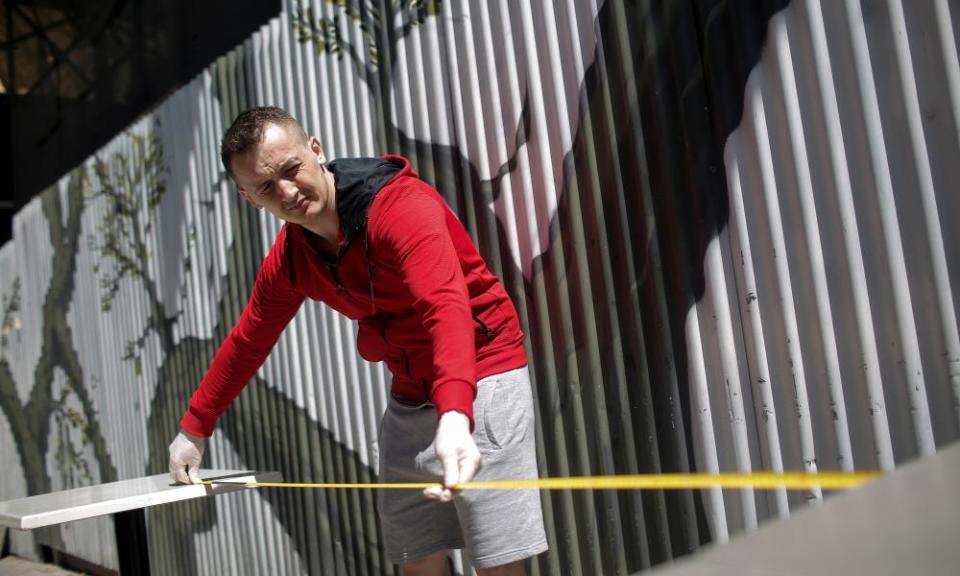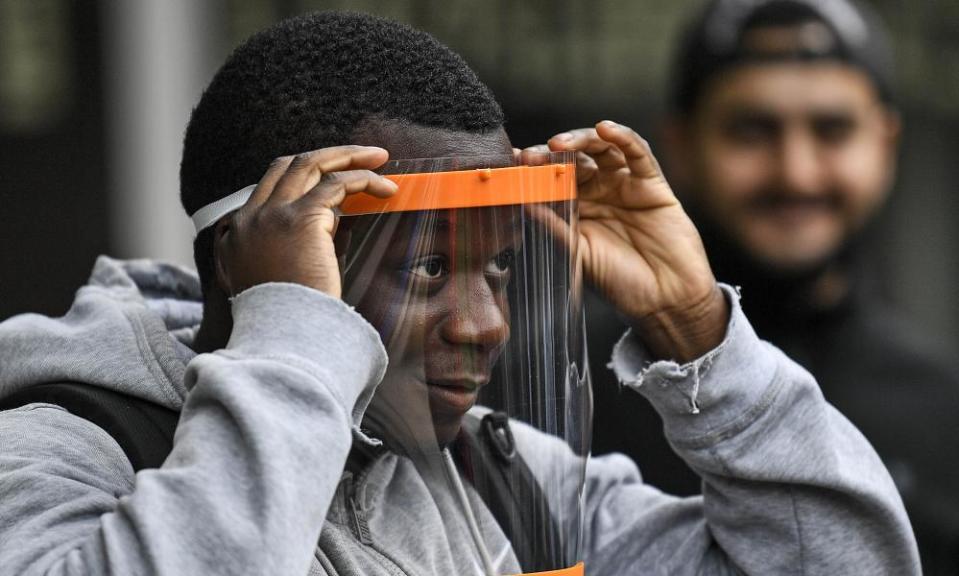Global report: Europe eases out of lockdown as Memorial Day draws big US crowds

Madrid and Barcelona reopened their parks, Copenhagen unlocked its museums, the bars of Reykjavik resumed business and restaurants in Athens took orders again on Monday as Europe continued to ease its lockdown restrictions.
Residents of Spain’s two biggest cities can now meet in groups of up to 10 in their homes or on the outside terraces of bars and restaurants, as both moved belatedly into the second phase of looser lockdown restrictions.
Small shops can also open without appointments. Madrid’s mayor, José Luis Martínez-Almeida, marked the occasion by tweeting a picture of himself in the city’s famous El Retiro park. “Open,” he tweeted. “Good morning, and let’s be responsible.”
Almost half of Spain has already moved to phase three, with shopping centres allowed to open and restaurants to serve customers indoors at 40% capacity. Cinemas and theatres may also reopen, but sell no more than 30% of tickets for each performance.
default
Many bars and restaurants in Madrid and Barcelona stayed closed, however, unsure of the value of catering to just a few locals and no tourists. The government has said a 14-day quarantine requirement for overseas arrivals will be lifted by 1 July.
“It is perfectly coherent to plan summer vacations to come to Spain in July,” said the tourism minister, Reyes Maroto. Spain usually draws 80 million visitors a people a year, and with tourism accounting for over 12% of GDP, the summer season is crucial.
As Italy reopened its swimming pools and sports centres, restaurants and cafes across Greece opened earlier than planned on Monday as it too prepared to launch a shortened tourism season that will be vital for its economic recovery.
But with physical distancing rules limiting businesses to around 50% and only outdoor tables allowed, many owners, torn between fear of the virus and the need to restart their businesses, questioned the wisdom of reopening after a two-month lockdown.

“We have to disinfect everything all the time … We’d have to hire someone to clean up and keep track of the customers, but are unable to do that,” one cafe owner, Vangelis Daskalopoulos, told AFP. “I don’t know how we’re going to manage.”
Daskalopoulos said he had to maintain a distance of 70cm between seats and a maximum of six seated customers per table. Cafes and restaurants were to open on 1 June, but the slow spread of the virus in Greece meant the date was brought forward.
In Germany, central and regional governments clashed over when and how far to further ease restrictions after Bodo Ramelow, the premier of the eastern state of Thuringia, said on Saturday that he would scrap rules on mask wearing and distancing and rely instead on local measures.
“I didn’t say that people should start hugging each other or take off their masks to kiss each other,” Ramelow said. But it made no sense to maintain crisis measures when half of the districts in his state had reported no new infections for three weeks, he said.
Saxony, also in the former communist east, also said it would “open up everything” with few exceptions from 6 June while monitoring for new outbreaks. Under Germany’s federalist system, the 16 regional states have far more leeway to set policy than in more centrally governed countries such as Britain and France.
Officials fear muddying the message could undermine public discipline. “Under no circumstances should the impression be given that the pandemic is over,” the health minister, Jens Spahn, told Bild newspaper, adding that clear messaging was vital to ensure the virus did not spread faster.

Shops, bars, restaurants, museums and churches have reopened in Germany, though many people continue to work from home. As restrictions have slowly been lifted there have also been alarming spikes, with a single church service in the central state of Hesse on 10 May causing at least 107 new cases.
The Czech Republic lifted its rule requiring face masks to be worn in public as it entered the final phase of an easing of lockdown restrictions in which pubs, restaurants, hotels and museums have been fully reopening their doors.
Sweden said its coronavirus death toll had reached 4,029, with 33,843 confirmed cases. The country has adopted a light-touch approach to containing the virus, eschewing the mandatory lockdowns imposed by many other European countries, but has recorded a far higher per-capita toll than its near neighbours.
More than 5.4 million people worldwide have been infected by the coronavirus and more than 345,000 have died, according to the Johns Hopkins University tracker.
Beyond Europe, TV footage of big crowds for the Memorial Day weekend in the US, which is on course to exceed 100,000 deaths in the next few days, prompted alarm from Deborah Birx, the coordinator of the White House coronavirus taskforce.
“We really want to be clear all the time that social distancing is absolutely critical. And if you can’t social distance and you’re outside, you must wear a mask,” she said.
Japan, which lifted a nationwide state of emergency for much of the country last week, followed suit for the greater Tokyo and northern Hokkaido regions on Monday, gradually reopening the world’s third-largest economy.
Japan has been spared the worst of the pandemic with 830 deaths, but introduced the state of emergency, along with voluntary distancing measures on 7 April as infections began to rise. Citizens largely heeded the orders, and the number of new infections has fallen from a peak of around 700 a day to just a few dozen.
The prime minister, Shinzo Abe, said people would have to adapt to a “new normal” and continue to avoid the “three Cs” - closed spaces, crowded places and close contact. “If we lower our guard, the infection will spread very rapidly,” he said. “We need to create a new lifestyle. From now on we need to change our way of thinking.”

 Yahoo News
Yahoo News 